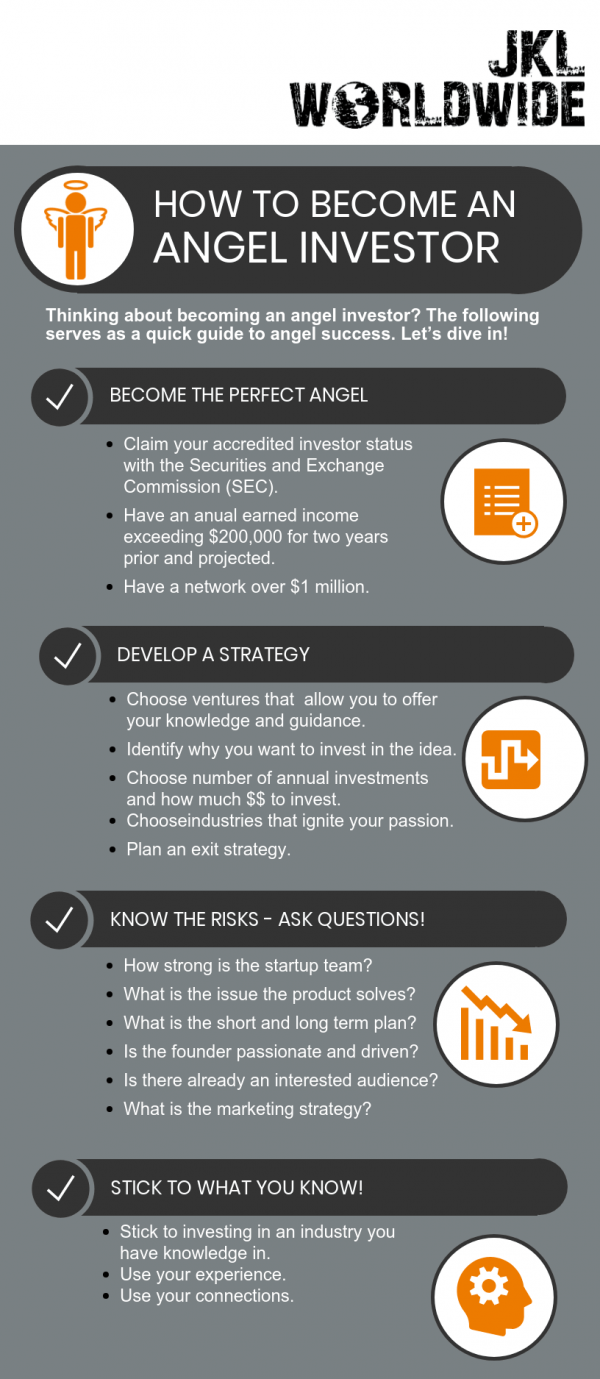By Jeremy Larner
Thinking about becoming an angel investor? Becoming an angel can be a rewarding moment in your professional, and even personal life. You have reached a moment in your life when you have disposable funds to make a difference, explore passions, and potentially invest in the next game-changing startup.
However, it is important to know that being an angel investor, and being a successful angel, are two entirely different things. The following serves as a quick guide to angel success. Let’s dive in!
Become an Accredited Angel Investor
When starting your angel investor journey, it is best to claim your accredited investor status with the Securities and Exchange Commission (SEC). They have guidelines in place for potential angels to become an investor the right way.
The SEC guidelines for accredited investors include:
- An “earned income that exceeded $200,000 (or $300,000 together with a spouse) in each of the prior two years, and reasonably expects the same for the current year.”
- Have a “net worth over $1 million, either alone or together with a spouse (excluding the value of the person’s primary residence).”
Why is this important? When startups get funding from an accredited angel investor, they can get an exempt SEC filing status, as well as exemption from state government tax filings.
Develop an Investor Strategy
Another important factor to consider when becoming an angel is having an investor strategy in place for startups and entrepreneurial endeavors. If you want to be successful, this is vital. Your investment strategy can include:
- The reasons you want to invest in a startup or entrepreneur’s idea.
- Types of industries you are passionate about and willing to invest in.
- Industries you have knowledge in, allowing you to offer guidance to founders.
- Number of investments you aim to make a year, and the amounts you’re willing to invest per each.
- Type of exit strategy that is most favorable to you as an angel investor.
Having an investor strategy is only half the battle. You need to stick to your strategy to facilitate success as well. You can stray from your strategy every so often, but doing it too often can expose you to a number of investment risks.
Understand the Risks of Angel Investing
Becoming an angel investor isn’t simply about funding unique projects you feel are important. One of the most essential elements in having success as an angel is understanding the risks. Knowing these risks can help you mitigate investment failure.
A few questions to put into practice prior to investing are:
- How strong is the team of the startup?
- What is the product exactly, and is it patented?
- Does the product solve an issue many people have?
- What is the market for the product?
- Does the startup have an interested audience in place already?
- What’s the short-term and long-term plan for the startup?
- Is the founder passionate and driven?
- What is the marketing strategy?
These questions can help you see potential risks and make investment decisions. Question risks can also assist you in doing research about the startup, the founder, team, marketplace, and future aims. Doing your due diligence is absolutely important to becoming a successful angel investor.

Be an Angel in Your Industry
One of the best ways to accomplish all your angel investor goals is to stick to investing in your industry, or at least until you have a few years of investment under your belt. Why is this an important part of being an angel? When you invest in your industry, you have most of the answers to your research questions.
For example, if you are a seasoned, successful app developer ready to begin your angel journey, staying in the app development space is ideal. You have a robust portfolio of knowledge in your industry, connections, and you are able to make vital decisions that can catalyze startup growth and success.
Spread Your Angel Wings . . .
Becoming an angel investor is not something to take lightly. Like any investment, there are risks and hours of research that you’ll need to do to make smart decisions. Becoming an accredited investor and sticking to what you’re good at is the best way to begin your angel journey. Once you score a few wins, you can begin a bolder approach. Questions? We want to hear them.
Jeremy Larner is an angel investor who has helped finance over 100 startups. His most notable investments include Dollar Shave Club and Postmates.com. Beyond angel investing, he also runs JKLWorldwide.com, conducting procurement and investment strategies for a wealthy clientele in the world of art.







